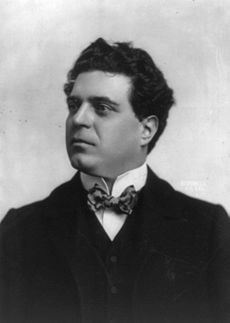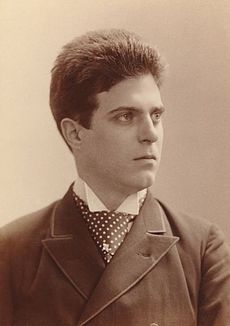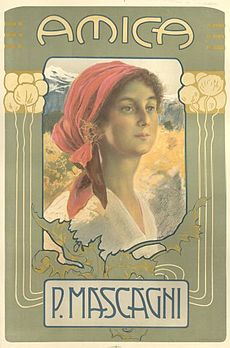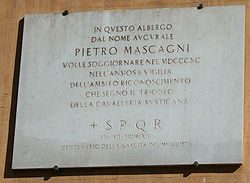- Pietro Mascagni
-
Pietro Antonio Stefano Mascagni (December 7, 1863 – August 2, 1945) was an Italian composer most noted for his operas. His 1890 masterpiece Cavalleria rusticana caused one of the greatest sensations in opera history and single-handedly ushered in the Verismo movement in Italian dramatic music. Though it has been stated that Mascagni, like Leoncavallo, was a "one-opera man" who could never repeat his first success, this is inaccurate. L'amico Fritz and Iris have been popular in Europe since their respective premieres. In fact, Mascagni himself claimed that at one point Iris was performed in Italy more often than Cavalleria (cf. Stivender).
Mascagni wrote fifteen operas, an operetta, several orchestral and vocal works, as well as songs and piano music. He enjoyed immense success during his lifetime, both as a composer and conductor of his own and other people's music. If he never repeated the international success of Cavalleria, it was probably because Mascagni refused to copy himself. The variety of styles in his operas — the Sicilian passion and warmth of Cavalleria, the exotic flavor of Iris, the idyllic breeze that ventilates the charming L'amico Fritz and Lodoletta, the Gallic chiaroscuro of Isabeau, the steely, Veristic power of Il piccolo Marat, the overripe postromanticism of the lush Parisina — demonstrate a versatility that surpasses even that of Puccini.
Contents
Biography
Early life
Pietro Antonio Stefano Mascagni was born in Livorno, Tuscany, the second son of Domenico and Emilia Mascagni. The father was the owner of a bakery. Mascagni's lifelong friend and collaborator, Giovanni Targioni-Tozzetti ("Nanni") was born the same year in the same city.
In 1876, he began musical studies with Alfredo Soffredini, who founded the Instituto Musicale di Livorno (later called Istituto Cherubini) after having just completed his musical studies in Milan. Also from Livorno, Soffredini was a composer, teacher and musical critic.
In 1879, he composed several works: Sinfonia in do minore, Elegia, Kyrie, Gloria and Ave Maria.
1880-1889
The premiere of Mascagni's first cantata, In Filanda, took place at the Istituto Cherubini on February 9, 1881. The cantata was presented at a musical contest in Milan and won the first prize. In the same year Mascagni met Arrigo Boito and Amilcare Ponchielli in Milan.
In 1882, he composed his Cantata alla gioia from a text by Schiller, La stella di Garibaldi for voice and piano and La tua stella. On May 6, Mascagni left Livorno for Milan. He passed the admission examination of the Milan Conservatory on October 12. In Milan, Mascagni met Giacomo Puccini.
On January 9, 1883, Mascagni's sister, Maria, died. The cantata In Filanda became Pinotta, and was proposed for the musical contest of the Conservatorio, but the registration, being late, was not accepted.
In 1884, he composed Ballata for tenor and piano; M'ama non m'ama, scherzo for soprano and piano; Messagio d'amore, and Alla luna.
In 1885, Mascagni composed Il Re a Napoli in Cremona, romance for tenor and orchestra, on a text by Andrea Maffei. He left Milan without completing his studies. He toured as conductor in the operetta companies of Vittorio Forlì, Alfonso and Ciro Scognamiglio, and in Genova, the company of Luigi Arnaldo Vassallo.
Mascagni met the impresario Luigi Maresca in 1886. That December, Mascagni arrived in Cerignola with Maresca's company. He was accompanied by Argenide Marcellina Carbognani (Lina), his future wife. Helped by the mayor Giuseppe Cannone, Mascagni soon left the company of Maresca, not without problems, and became master of music and singing of the new philharmonia of Cerignola, where he earned a lot of esteem. He also gave piano lessons.
In February 1888, work on the Messa di Gloria started. In July, Casa Sonzogno announced in the Teatro Illustrato its second competition for a one-act opera.
Pietro and Lina were married on February 3, 1889. The next day Domenico Mascagni ("Mimì") was born. The composition of Cavalleria rusticana was completed on May 27 and the manuscript sent to Milan.
1890-1899
On February 21, 1890, Mascagni was summoned to Rome to present his opera. The première of Cavalleria rusticana, winner of the Sonzogno contest, was held May 17 at the Teatro Costanzi in Rome. The success was outstanding, and very soon the opera was performed in Florence, Turin, Bologna, Palermo, Milan, Genoa, Naples, Venice and Trieste. In December, Gustav Mahler conducted the opera in Budapest. Soon thereafter, the cities of Munich, Hamburg, St. Petersburg, Dresden and Buenos Aires welcomed the opera. In March 1891, it was sung in Vienna. At age 26, Mascagni had become famous overnight. In the meantime (January 3) his second son, Dino, was born. He was followed by a daughter, Emi, in 1892.
L'amico Fritz, Mascagni's second most successful opera, was premiered October 31 at the Teatro Costanzi in Rome. I Rantzau was premiered November 10 at the Teatro La Pergola, in Florence, under the direction of the composer himself.
Next Mascagni's opera was the Silvano (1894). On February 16, 1895 Guglielmo Ratcliff was premiered at the Teatro alla Scala of Milan. On March 15, Silvano was premiered at the Teatro alla Scala of Milan. Mascagni in the same year accepted the directorship of the Liceo Rossini in Pesaro.
On March 2, 1896, Mascagni conducted the première of Zanetto at the Liceo.
On June 29, 1898 in Recanati, Mascagni conducted the première of a symphonic poem, A Giacomo Leopardi. Iris, Mascagni's first collaboration with Luigi Illica was premiered on November 22 at the Teatro Costanzi in Rome.
Mascagni's father died in May 1899.
1900-1909
In 1900, Mascagni toured Moscow and St. Petersburg.
On January 17, 1901, Le maschere was premiered in six Italian theaters. Giuseppe Verdi died on January 27 and the following month Mascagni commemorated Verdi's passing. That same year, he conducted Verdi's Requiem in Vienna.
Mascagni composed the incidental music for Hall Caine's play, The Eternal City in August 1902; the première of the play with Mascagni's music took place in London on October 2.
In 1902 and 1903, he toured in Canada and in the United States, (in particular Montreal, New York City, Philadelphia, Boston and San Francisco), where he conducted many of his and other composers' works. The tour was mostly a fiasco, except for the visit to San Francisco where Mascagni was extremely well received.
In 1903, Mascagni left Pesaro after problems with the authorities. He became director of the Scuola Musicale Romana, in Rome. In the same year he signed a contract with the French editor Choudens.
Amica, with libretto by Choudens, was premiered on March 16, 1905, in Monte-Carlo. That year, he had disputes with Ruggero Leoncavallo and Giacomo Puccini. He also had the Livornese première of Le maschere.
Mascagni was director of the Costanzi for the season beginning in August 1909.
1910-1919
On April 4, 1910, Mascagni began a relationship with Anna Lolli. In October he was reconciled with Puccini.
Mascagni ceased his activity as director of the Scuola Musicale Romana in 1911. That May, he left for Buenos Aires, beginning a seven-month tour in South America. The première of Isabeau took place in Buenos Aires on June 2.
The Italian première of Isabeau was held simultaneously at La Scala in Milan (conductor Tullio Serafin) and at La Fenice in Venice (conductor Mascagni) in 1912. On March 28, he began to work on Parisina in Bellevue [disambiguation needed
 ], near Paris, sometimes with his daughter Emi, his mistress Anna Lolli, and the librettist Gabriele d'Annunzio.
], near Paris, sometimes with his daughter Emi, his mistress Anna Lolli, and the librettist Gabriele d'Annunzio.Parisina was premiered in Milan on December 15 of that year. Almost all the important Italian composers of the time were present, among them Puccini, Umberto Giordano and Riccardo Zandonai. The new work was premiered in Livorno and Rome in 1914. On July 28 occurred the events that shortly led to World War I: Puccini and Mascagni were against the involvement of Italy in this war, where Mascagni's son Dino was later made a prisoner.
In 1915 Mascagni wrote music for Nino Oxilia's movie Rapsodia Satanica; the custom was for silent films to be accompanied live in a theater by organ, piano, or an orchestra, often using a prepared score (sometimes with original music) with cues for the conductor or musician. Mascagni had a quarrel regarding the rights of Louise de la Ramée's Two Little Wooden Shoes (I due Zoccoletti), that inspired both Puccini and Mascagni. The subject was retained by Mascagni for Lodoletta. The latter opera was premiered on April 30, 1917 in Rome. The Livornese première of the opera was on July 28 with Beniamino Gigli as Flammen.
Sì, Mascagni's operetta, was premiered on December 13 in Rome.
1920-1939
In 1920 Mascagni composed Il piccolo Marat, which was premiered in Rome on May 2, 1921, following by a premiere in Buenos Aires in September. The composer returned to South America for a tour beginning in May 1922.
In 1923, he composed Visione Lirica. He moved to the Albergo Plaza in Rome in 1927, a place he would not leave until his death.
In 1930, Mascagni conducted La bohème in Torre del Lago, as a homage to Puccini, who had died in 1924. In 1931, Le maschere was performed at La Scala.
Pinotta was premiered in San Remo on March 23, 1932. He joined the PNF (Fascist party), following the example of many contemporary musicians, including Giordano.
Nerone was premièred in Milan on January 16, 1935, followed by the première in Livorno on August 24.
In June 1936, Mascagni's son[which?] died in Somalia.
Last years
In 1940, celebrations for the fiftieth anniversary of his most popular opera, Cavalleria rusticana, took place all over Italy, often with Mascagni conducting. The opera was recorded for La Voce del padrone ("His Master's Voice") at La Scala under the direction of Mascagni, who recorded a special spoken introduction. EMI later reissued the recording on LP and CD.
In 1942, after an audience with Pope Pius XII, newspapers quoted Mascagni, a Roman Catholic, as saying that his tuberculosis-stricken niece was cured after receiving a rosary and silver medal blessed by the pope.[1]
In April 1943, Mascagni appeared for the last time at La Scala to conduct L'amico Fritz. By that time he had to conduct sitting on a chair. The last season of Mascagni at the Rome Opera (Cavalleria rusticana and L'amico Fritz) was 1944–45.
Mascagni died on August 2, 1945 in his apartment at the Hotel Plaza di Roma. The funeral ceremony was August 4. The Italian authorities were not present. In 1951, the mortal remains of Mascagni were transferred from Rome to Livorno, where finally Mascagni received an official homage.
Selected works
Operas
- Cavalleria rusticana (17 May 1890 Teatro Costanzi, Rome) - libretto, libretto
- L'amico Fritz (31 October 1891 Teatro Costanzi, Rome) - libretto
- I Rantzau (10 November 1892 Teatro La Pergola, Florence)
- Guglielmo Ratcliff (16 February 1895 Teatro alla Scala, Milan), composed between 1885 and the early 1890s - libretto
- Silvano (25 March 1895 Teatro alla Scala, Milan)
- Zanetto (2 March 1896 Liceo Musicale, Pesaro) - libretto
- Iris (22 November 1898 Teatro Costanzi, Rome) - libretto
- Le maschere (17 January 1901 Teatro Carlo Felice, Genoa - Teatro Regio, Turin - Teatro alla Scala, Milan - Teatro La Fenice, Venice - Teatro Filarmonico, Verona - Teatro Costanzi, Rome)
- Amica (16 March 1905, Monte Carlo, in French) - Italian libretto
- Isabeau (2 June 1911 Teatro Coliseo, Buenos Aires)
- Parisina (15 December 1913 Teatro alla Scala, Milan) - libretto
- Lodoletta (30 April 1917 Teatro Costanzi, Rome) - libretto
- Il piccolo Marat (2 May 1921 Teatro Costanzi, Rome)
- Pinotta (23 March 1932 Casinò, San Remo), adapted from the cantata In filanda (1881)
- Nerone (16 January 1935 Teatro alla Scala, Milan), with music written between the 1890s and the 1930s
Operetta
- Sì (13 December 1919 Teatro Quirino, Rome)
Sacred music
- Messa di Gloria in F major for soloists, chorus and orchestra
Orchestral music
- A Giacomo Leopardi, cantata for voice (soprano) and orchestra (June 19, 1898, Teatro Persiani, Recanati)
- Il re a Napoli, romanza for tenor and orchestra (18 March 1885 Teatro Municipale, Cremona)
Projects contemplated
During his long career, Mascagni contemplated writing many operas. The following is an incomplete list of such projects, which never saw the light of day:
- Zilia, probably on a libretto by Felice Romani (c. 1877)
- Scampolo, probably on a libretto by Dario Niccodemi (c. 1921)
- I Bianchi ed i Neri, on a libretto by Mario Ghisalberti (c. 1938)
Cutural references
The 1980 film Raging Bull prominently features the following music: the Intermezzo from Cavalleria rusticana, the Barcarolle from Silvano, and the Intermezzo from Guglielmo Ratcliff (known as Il sogno di Ratcliff).
The 1990 film The Godfather Part III used a production of Cavalleria rusticana at the Teatro Massimo to set its climax, with Michael Corleone's son Anthony as Turiddu. The movie ends with the Intermezzo playing.
In 2000, electronic musician William Orbit included a modern, electronic orchestration of an excerpt from Mascagni's Cavalleria rusticana on his album Pieces in a Modern Style.
See also
- List of people on the cover of Time Magazine: 1920s - 6 Sep. 1926
References
- ^ Miracles and visions may make Pius XII a Saint, United Press International, UPI, October 9, 1958,
Sources
- Mallach, Alan (2002). Pietro Mascagni and His Operas. Boston: Northeastern University Press. ISBN 1-55553-524-0.
- Flury, Roger (2001). Pietro Mascagni - A Bio-Bibliography. London: Greenwood Press. ISBN 0-313-29662-6.
- Iovino, Roberto (1987). Mascagni, l'avventuroso dell'opera. Camunia. ISBN 88-7767-014-2.
- English web site about Pietro Mascagni
- Official Italian web site about Pietro Mascagni
- Buoso Donati, "Mascagni and Mussolini" Bibliography.
- Opera at Stanford University
- Works by Pietro Mascagni at Project Gutenberg
External links
Categories:- 1863 births
- 1945 deaths
- 20th-century classical composers
- Italian composers
- Italian Roman Catholics
- Members of the Royal Academy of Italy
- Milan Conservatory alumni
- Opera composers
- People from Livorno
- Romantic composers
Wikimedia Foundation. 2010.




